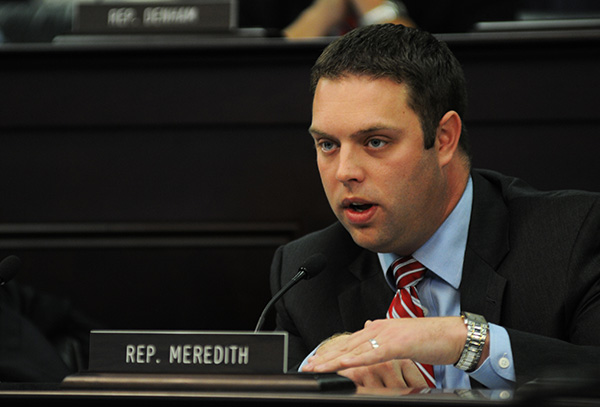Kentucky’s cities have placed increased 9-1-1 call center funding at the top of their state legislative wish list for the second year in a row.
Officials from the Kentucky League of Cities appeared before the Interim Joint Committee on Local Government today requesting that lawmakers pass legislation next year that would raise the 911 call center fee on wireless phone users to what they call “a reasonable level.” Wireless 911 fees comprise only a fraction of fee receipts but represent a growing number of 911 calls in the state, said KLC President and Williamsburg Mayor Roddy Harrison.
In Whitley County where Harrison lives, 9-1-1 call volume has increased 50 percent. “And we’re on pace right now to hit 60,000 calls” in a county of 36,000 people,” he said.

Rep. Michael Meredith, R-Brownsville, asks a question about city governments’ legislative priorities for the upcoming legislative session during the October meeting of the Interim Joint Committee on Local Government. (Photo by LRC Public Information)
That’s a problem for the call centers or, more officially, PSAPs (public safety answering points) that at present are most reliant on fees from dwindling landline phone users. Local governments are having to dip into their General Funds to cover costs—and that is straining their budgets, Harrison said.
“This has forced cities and counties to use our General Fund dollars to replace lost funding for maintenance of this service,” said Harrison.
Harrison told lawmakers that KLC in turn supports incentives to encourage consolidation of PSAPs statewide—there are 112 PSAPS in Kentucky today—and hopes to correct discrepancies in collection of 911 fees from prepaid phone users who are largely exempt from paying the fees.
“We are seeking to replace lost revenue,” not create new revenue, Harrison told the committee.
Committee Co-Chair Sen. Joe Bowen, R-Owensboro, said he is glad to hear about KLC’s support for incentivizing consolidation of more PSAPs.
“I think that’s probably one of the most critical components of this whole issue, and certainly one that we’re going to have to probably address in some manner,” said Bowen. His fellow co-chair, Rep. Steve Riggs, D-Louisville, was also interested in that subject.
“Where did we get the notion that every county or every unit of local government has to have a PSAP? Perhaps that’s our fault that we didn’t say you have to have one per Area Development District) or one per every 200,000 in population, give or take, because what you want to base the cost and expense on is the certain number of people you serve,” said Riggs.
Second on the KLC legislative wish list is legislative changes to the state’s nearly 70-year-old local road funding formula. Cities receive municipal road aid under a 1972 law, while county road aid and rural secondary road aid is divided based on a “formula of fifths” that divides 3/5 of funds based on an equal share to counties, percentage of rural road mileage and percentage of rural population. The remaining 2/5ths are allocated based on a county’s percent of total state rural land area. The formula has become “antiquated” as counties grow and change, said Harrison, who told the committee that KLC would like the General Assembly to move to a single road program and new formula that better serves municipalities.
The new program would do away with equal share to counties and references to rural and urban population, said Harrison. It would also put population and road miles ahead of land area as factors for funding and require counties to spend road aid funds in a way that ensures roads in Kentucky are “adequately maintained,” he said.
The new funding formula would be a “formula of thirds” that Harrison said would factor one third by dividing incorporated versus unincorporated population, another third by dividing incorporated versus unincorporated road miles and a third factored by dividing incorporated versus unincorporated land miles. He said the formula would increase road aid “for all cities and for six counties including Boone, Christian, Laurel, Oldham, Pulaski and Warren.”
“KLC supports the restructuring of the road funding formulas for a more equitable allocation to local governments with higher traffic areas that have more frequent needs,” Harrison told the committee.
The third KLC wish list item shared by Harrison is twofold: get state legislative approval granting all cities the option to levy a restaurant tax and, secondly, get a local option sales tax amendment placed on statewide ballot (similar to a proposal approved this year in the House by a vote of 62-35) for voter approval.
Currently 38 states allow at least one of their local governments to enact a local option sales tax, according to the KLC.
From Kentucky Legislative Research Commission



















